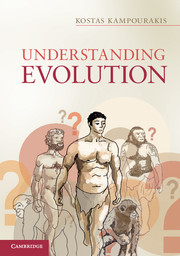Book contents
1 - An evolving world
Published online by Cambridge University Press: 05 June 2014
Summary
What is evolution? One might define it in many different ways. The term “evolution” might refer either to the fact that organisms have changed over the course of eons, or to the process by which this has taken place or to the outcome of this process, which includes both the exquisite adaptations of organisms and their outstandingly common features. As I do many times in this book, I rely on Charles Darwin’s The Origin of Species (1859), the foundational text of current evolutionary theory, to define evolution. Darwin proposed a “theory of descent with modification through natural selection” (Darwin, 1859, p. 343), as an explanation for “the origin of species – that mystery of mysteries” (p. 1). In particular, he aimed to explain the origin of the adaptations of organisms: “how the innumerable species inhabiting this world have been modified, so as to acquire that perfection of structure and coadaptation which most justly excites our admiration” (p. 3). The phrase “descent with modification” includes the two central ideas of evolution: All organisms are related to each other because they have descended from a common ancestor through a process of modification that has produced new life forms from pre-existing ones. Thus, evolution might briefly be defined as the natural process by which new species emerge as the modified descendants of pre-existing ones. Evolutionary theory is the scientific theory that explains how this process has taken, and still takes, place on Earth, with reference to particular, old and current, aspects of life on Earth and to particular episodes of its history. What is most important is that evolutionary theory can account for both the unity and the diversity of life. Life has evolved from one or a few universal common ancestor(s) to many different forms of various shapes, sizes, colors, behaviors, and habits. This notwithstanding, they all share some major characters, inherited from the common ancestor(s). Evolutionary theory provides the best explanations (so far) for all these phenomena.
- Type
- Chapter
- Information
- Understanding Evolution , pp. 1 - 30Publisher: Cambridge University PressPrint publication year: 2014



